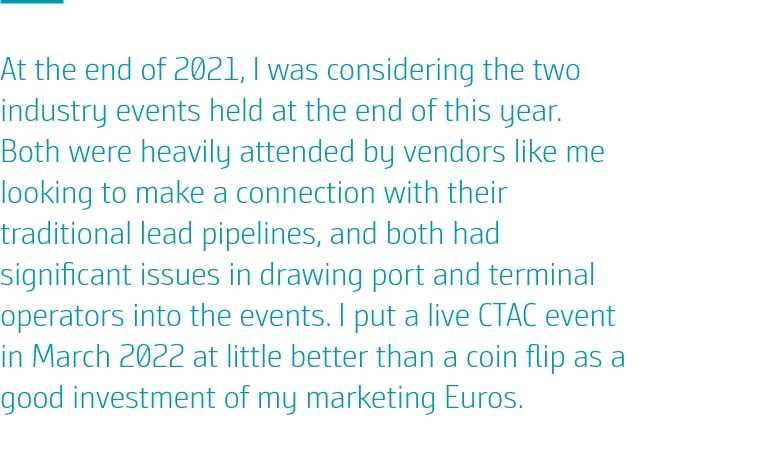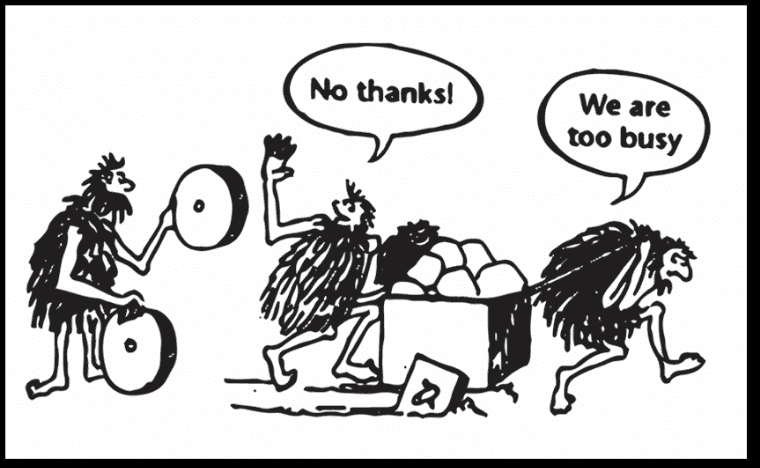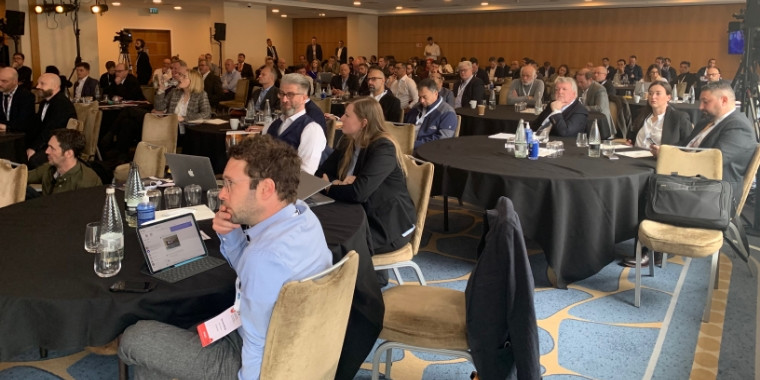Mar 14, 2022 Matthew Wittemeier
ShareAs I sit on the train from London back to Germany, I’ve got the time to reflect on this year’s first live, in-person event, the Container Terminal Automation Conference (CTAC) 2022. Since 2020, the event has been held digitally, and this past week (March 9-10) saw it return to London. Despite my initial concerns of poor delegate turnout based on a couple of maritime industry events held in the latter half of 2021, I was very pleasantly surprised to see dozens of industry colleagues and even some new faces added into the mix. In short, CTAC 2022 was an exceptional gathering of terminal operators and vendors that came together to talk, listen, drink, and eat together and to meet in person with the aim of bringing the industry back together.
For me, the journey to bringing the industry back to a live event is bigger than the conversation about the interesting topics from the event. I’m sure the team from PTI will write a great wrap-up of the content discussed. I want to focus on a discussion of the big picture of what supporting CTAC 2022 as the Official AI Partner meant and why it is important. Why? The answer is simple, for great events to take place, they need sponsors (from both the vendor and terminal side) to have faith that bringing our industry back together for in-person events is worth the gamble. If you’re a marketing professional in the maritime industry, the first half of this piece is for you.
It Was a Gamble
At the end of 2021, I was considering the two industry events held at the end of this year. Both were heavily attended by vendors like me looking to make a connection with their traditional lead pipelines, and both had significant issues in drawing port and terminal operators into the events. I put a live CTAC event in March 2022 at little better than a coin flip as a good investment of my marketing Euros. Having said that, I knew that the team at Port Technology was determined to bring CTAC back in 2022 as a live event, and for the past five years, they haven’t failed to deliver an exceptional CTAC experience and deliver on their promises to me as a significant sponsor. We signed the contract, and I crossed my fingers.

Things Came Together
Despite a slow start of getting delegates signed up to attend live in London, the team at PTI really pulled through with over 120 top-notch speakers and delegates coming together in London for two days of discussion and networking. What looked like a seamless event to delegates and speakers was, in fact, a massive effort with a team of professionals from PTI working to ensure the event came off without a hitch. They juggled expert speakers who could not travel due to company constraints through to speakers contracting COVID-19 the night before they were due on stage. Of course, allowing these speakers to attend remotely proved that a hybrid presentation would not only work but would work well, and after two full days of conversation (and I’ve picked this word specifically given the format was almost exclusively panel discussions), our industries first, truly successful live event drew to a close.
You might be asking me why it was successful. The short answer is that it was collaborative. The long answer is there were healthy debates and conversations everywhere you looked or listened. There was a (mostly) balance between vendors (about 60% of participants) and terminal operators (about 40% of participants). As a sponsor, of course, I would like that number to be the other way around, but this split isn’t that far off from pre-pandemic events. Finally, there was networking. Over the past two years, no digital event was able to get the networking element right. As an industry, we were so keen to network that the post-conference, unofficial “INFORM” drinks and networking at the pub down the road had the strongest turnout I’ve ever seen. Some 30 attendees gathered for one last two hours of conversation.
Why Are Events Important?
If you weren’t sitting in the conference room, this next point might be difficult to fully understand, but bear with me. I’ve moderated conference sessions since 2018 at events around the world, and the first thing I must say is that moderating a digital panel is a nightmare. Sure, we pull it off, but the dynamics are entirely different when you’re on stage with your panelists. Body language tells you who wants to talk and who doesn’t. And the interaction that panelists have with the live audience’s response can’t be put into words. There’s also something really special about a roving microphone for live questions and opinions from the audience. Again, something that is almost entirely lost in digital events.
In short, the conversation is more diverse, in-depth, and real. Technical difficulties don’t interrupt the flow of the conversation. There was only one “you’re muted” to manage over two days of discussions. What’s more, the conversation doesn’t end when the session ends. The audience is free to engage with speakers and each other, and the conversation continues over coffee, lunch, and evening drinks.

Why Is Participating Important?
Participation is a two-way street between vendors and terminal operators. We need vendors to sponsor events for two reasons. One, our event organizers are in business to make money; they aren’t an NFP. Without making a return, the events on which we rely as an industry to share knowledge and gain insights will cease to exist. Two, it keeps the cost of tickets for terminal operators low and, in some cases, free.
On the other side of the road, vendors will only sponsor if terminal operators are attending. We want to share our latest and greatest with you. We have a business need to fill our pipelines, and we do that by meeting familiar faces and learning about new projects in the works, and by meeting new contacts along the way.
There’s a Simple Event Equation
The equation that runs events is really a simple equation. Terminal operators’ attendance drives sponsors to invest in events. This investment drives revenue for event organizers. As an industry, I’ve heard and seen many examples of terminal operators having zero-travel policies that prevent their staff from attending events. This is a huge mistake for two reasons. Firstly, without terminal operators in attendance, vendors won’t sponsor. If vendors don’t sponsor, event organizers won’t put on events. If we don’t have events, the information-sharing that our industry benefits so strongly from grinds to a halt.

Secondly, we’ve all seen the cartoon of two cavemen pushing a cart with square wheels, and they say they’re too busy to listen to new ideas about circular wheels that will improve how they work. While “obvious,” the reality is that conferences are where we share ideas. It is easy to see terminal operators as the cavemen with the square wheels, but I would argue that it is just as likely that the vendors are the ones with square wheels. We rely as much on the information exchange at events for new ideas as the operators do.
So, I challenge you to challenge yourself. As events come back onto the schedules this year, please attend them. Share information. Share stories. Share insights. Network, learn, engage and remember that working together as an industry is what has propelled us forward through every past global disruption.
As a closing point, I want to say thank you to the entire team at Port Technology for having the confidence and endurance to bring us back to our industry’s first successful live event. Without your hard work in the run-up to the event and your nearly sleepless nights during the event, we wouldn’t have gotten there. We wouldn’t have had the pleasure of being reminded why live events are really important.
Thank you!
About our Expert

Matthew Wittemeier
Matthew Wittemeier was Director of Strategy for INFORM ANZ and previously served as Director of Marketing and Strategy for INFORM’s Terminal & Distribution Center Logistics Division. During his time at INFORM, he was a thought-provoking contributor to numerous industry publications and conferences. He is also co-author of the award-winning 2038: A Smart Port Story, which explores the future of technology and the social challenges it may bring.


